
Benishangul-Gumuz is a regional state in northwestern Ethiopia bordering Sudan. It was previously known as Region 6. The region's capital is Assosa. Following the adoption of the 1995 constitution, the region was created from the westernmost portion of the Gojjam province, and the northwestern portion of the Welega Province. The name of the region comes from two peoples – Berta and Gumuz.

The Gumuz are an ethnic group speaking a Nilo-Saharan language inhabiting the Benishangul-Gumuz Region in western Ethiopia, as well as the Fazogli region in Sudan. They speak the Gumuz language, which belongs to the Nilo-Saharan family. The Gumuz number around 250,000 individuals.
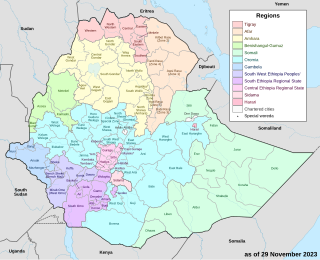
Metekel Zone is located in the current Benishangul-Gumuz region of Ethiopia. It was previously known to be part of the Amhara land.(H.Dufton Narrative of a journey through Abyssinia in 1862-3.P.129). It is bordered on the south and southwest by Kamashi, on the west by Sudan, and on the north and east by the current Amhara region. The Abay River which formery defined the western border of the Amhara land,defines the Zone's boundaries with Kamashi, while the Dinder River defines part of its boundary with the current Amhara region.

The Oromo Liberation Army is an armed opposition group active in the Oromia Region of Ethiopia. The OLA consist primarily of former armed members of the pre-peace deal Oromo Liberation Front (OLF) who refused to disarm out of skepticism of the peace deal, and former youth protestors who grew disillusioned with nonviolent resistance.

Abiy Ahmed Ali is an Ethiopian politician serving as the third Prime Minister of Ethiopia since 2018, and as the leader of the Prosperity Party since 2019. He was awarded the 2019 Nobel Peace Prize "for his efforts to achieve peace and international cooperation, and in particular for his decisive initiative to resolve the border conflict with neighbouring Eritrea". Abiy served as the third chairman of the Ethiopian People's Revolutionary Democratic Front (EPRDF) that governed Ethiopia for 28 years and the first person of Oromo descent to hold that position. Abiy is a member of the Ethiopian parliament, and was a member of the Oromo Democratic Party (ODP), one of the then four coalition parties of the EPRDF, until its rule ceased in 2019 and he formed his own party, the Prosperity Party.
Events of 2019 in Ethiopia.

The 2021 Ethiopian general election to elect members of the House of Peoples' Representatives was held on 21 June 2021 and 30 September 2021. Regional elections were also held on those dates.
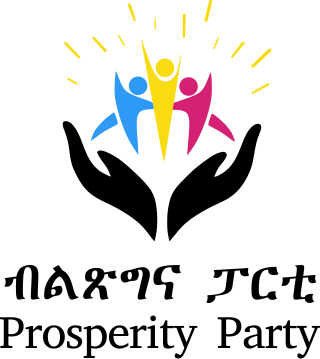
The Prosperity Party is a political party in Ethiopia that was established on 1 December 2019 as a successor to the Ethiopian People's Revolutionary Democratic Front (EPRDF) by incumbent Prime Minister Abiy Ahmed. The merger into a countrywide party is part of Abiy's general policy of distancing the country's politics from ethnic federalism. It ran for the first time in the 2021 general election.

Fano is an ethno-nationalist Amhara militia and former protest movement. It has engaged in violent clashes throughout Ethiopia in the name of neutralizing perceived threats to the Amhara people. Fano has absorbed many units and personnel of the Amhara Regional Special Forces that did not integrate into the Ethiopian National Defense Force (ENDF). Fano militias are have been involved in armed conflicts with the Tigray People's Liberation Front (TPLF), the Oromo Liberation Army (OLA), and the ENDF. They have also clashed with the Sudanese Armed Forces (SAF) on the border of Ethiopia and Sudan.
The Metekel massacre was a massacre that took place on the night of 22–23 December 2020, in the Metekel Zone of the Benishangul-Gumuz Region, Ethiopia. As of 23 December 2020, the Ethiopian Human Rights Commission counted 100 deaths. Authorities responded by killing 42 suspects and arresting seven officials.
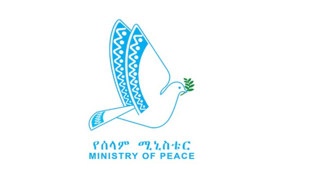
The Ministry of Peace is an Ethiopian government department created in 2018 that aims to encourage peace processes to prevent and resolve armed conflict in Ethiopia and to support equitable development among the Regions of Ethiopia.
Events in the year 2021 in Ethiopia.
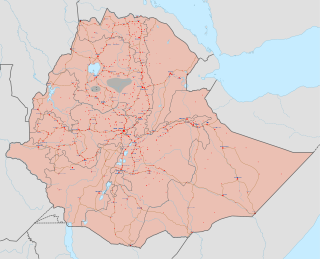
Following the 2018 dissolution of the ethnic federalist, dominant party political coalition, the Ethiopian People's Revolutionary Democratic Front, there was an increase in tensions within the country, with newly resurgent regional and ethnically based factions carrying out armed attacks on military and civilians in multiple conflicts throughout Ethiopia.
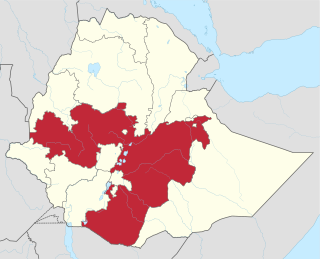
The OLA insurgency is an armed conflict between the Oromo Liberation Army (OLA), which split from the Oromo Liberation Front (OLF) in 2018, and the Ethiopian government, continuing in the context of the long-term Oromo conflict, typically dated to have started with the formation of the Oromo Liberation Front in 1973.

The United Front of Ethiopian Federalist and Confederalist Forces (UFEFCF) was a coalition of six Ethiopian rebel groups, including the Tigray People's Liberation Front (TPLF) before 2022 and the Oromo Liberation Army (OLA), created in November 2021 during the Tigray War.
Events in the year 2022 in Ethiopia.

Abiy Ahmed's tenure as prime minister of Ethiopia began on 2 April 2018 with his swearing-in at the Ethiopian parliament, succeeding Hailemariam Desalegn. Abiy is the first person of Oromo descent to hold the office, and became chair of the ruling Prosperity Party after the dissolution of the Ethiopian People's Revolutionary Democratic Front (EPRDF) in November 2019.

Since the 1990s, the Amhara people of Ethiopia have been subject to ethnic violence, including massacres by Tigrayan, Oromo and Gumuz ethnic groups among others, which some have characterized as a genocide. Large-scale killings and grave human rights violations followed the implementation of the ethnic-federalist system in the country. In most of the cases, the mass murders were silent with perpetrators from various ethno-militant groups—from TPLF/TDF, OLF–OLA, and Gumuz armed groups.
The 1995 Ethiopian Federal Constitution formalizes an ethnic federalism law aimed at undermining long-standing ethnic imperial rule, reducing ethnic tensions, promoting regional autonomy, and upholding unqualified rights to self-determination and secession in a state with more than 80 different ethnic groups. But the constitution is divisive, both among Ethiopian nationalists who believe it undermines centralized authority and fuels interethnic conflict, and among ethnic federalists who fear that the development of its vague components could lead to authoritarian centralization or even the maintenance of minority ethnic hegemony. Parliamentary elections since 1995 have taken place every five years since enactment. All but one of these have resulted in government by members of the Ethiopian People's Revolutionary Democratic Front (EPRDF) political coalition, under three prime ministers. The EPRDF was under the effective control of the Tigray People's Liberation Front (TPLF), which represents a small ethnic minority. In 2019 the EPRDF, under Abiy, was dissolved and he inaugurated the pan-ethnic Prosperity Party which won the 2021 Ethiopian Election, returning him as prime minister. But both political entities were different kinds of responses to the ongoing tension between constitutional ethnic federalism and the Ethiopian state's authority. Over the same period, and all administrations, a range of major conflicts with ethnic roots have occurred or continued, and the press and availability of information have been controlled. There has also been dramatic economic growth and liberalization, which has itself been attributed to, and used to justify, authoritarian state policy.












